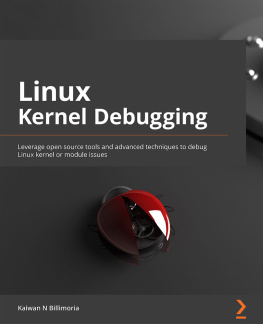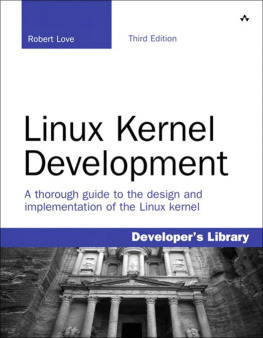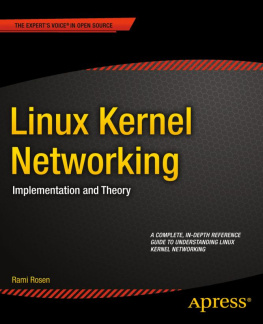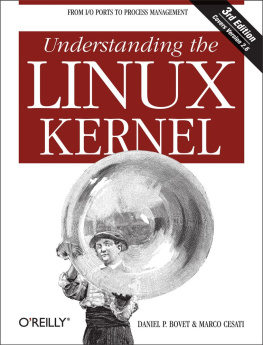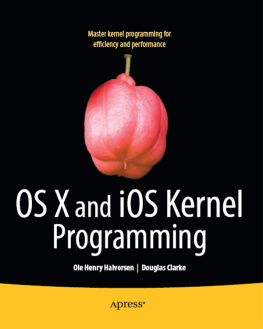Kaiwan N Billimoria - Linux Kernel Debugging
Here you can read online Kaiwan N Billimoria - Linux Kernel Debugging full text of the book (entire story) in english for free. Download pdf and epub, get meaning, cover and reviews about this ebook. year: 2022, publisher: Packt Publishing, genre: Computer. Description of the work, (preface) as well as reviews are available. Best literature library LitArk.com created for fans of good reading and offers a wide selection of genres:
Romance novel
Science fiction
Adventure
Detective
Science
History
Home and family
Prose
Art
Politics
Computer
Non-fiction
Religion
Business
Children
Humor
Choose a favorite category and find really read worthwhile books. Enjoy immersion in the world of imagination, feel the emotions of the characters or learn something new for yourself, make an fascinating discovery.
- Book:Linux Kernel Debugging
- Author:
- Publisher:Packt Publishing
- Genre:
- Year:2022
- Rating:3 / 5
- Favourites:Add to favourites
- Your mark:
Linux Kernel Debugging: summary, description and annotation
We offer to read an annotation, description, summary or preface (depends on what the author of the book "Linux Kernel Debugging" wrote himself). If you haven't found the necessary information about the book — write in the comments, we will try to find it.
- Learn how to use a variety of kernel and module debug tools and techniques with the help of examples
- Understand how to expertly interpret a kernel oops and identify the underlying defects
- Includes easy-to-look up tables and simplified explanations of complex kernel-level defects
The Linux kernel is at the very core of arguably the worlds best production-quality OS. Debugging it, though, can be a complex endeavor. Linux Kernel Debugging is a thorough guide to advanced kernel debugging.
This book covers a range of debugging techniques in detail, starting with instrumentation-based debugging techniques, the kernels powerful Kprobes framework, printk, and friends. The book features two whole chapters devoted to the tools and techniques for debugging memory-related bugs. It also prepares you to interpret the underlying issue when the Linux kernel throws an oops. As you advance through the chapters, youll be able to demystify concurrency by learning what data races are and how to handle them, including the use of modern features like Kernel Concurrency Sanitizer (KCSAN). Youll also discover how to overcome some thorny issues related to debugging and performance through detailed kernel-level tracing and learn to wield the power of Ftrace and its frontends. Whats more? The book shows you how to deal with kernel hangs and panic, leverage the venerable GDB tool within the kernel, and much more.
By the time you complete reading this debugging kernel book, youll have at your disposal, a whole range of powerful debug tools and techniques, along with a keen sense as to when to use which.
What you will learn- Instrumentation-based printk and the powerful dynamic debug framework
- Use Kprobes statically and dynamically to trap into kernel or module functions
- Catch kernel memory defects with KASAN, UBSAN, SLUB debug, and kmemleak
- Precisely identify the source location of kernel and module bugs
- Understand data races and use KCSAN to catch evasive concurrency defects
- Leverage Ftrace and trace-cmd to trace the kernel flow in great detail
- Write a custom kernel panic handler using the WD and hangcheck timer
- Learn to use KGDB to single-step and debug kernel or module source code
This book is for Linux kernel developers, module or driver authors, and testers interested in debugging and enhancing their Linux systems at the level of the kernel. System administrators who want to understand and debug the internal infrastructure of their Linux kernels will also find this book useful. A good hold of C programming and the Linux command line is necessary. Some experience with module or kernel development will be beneficial too.
Table of Contents- A General Introduction to Debugging Software
- Approaches to Kernel Debugging
- Debugging via Instrumentation - printk and friends
- Debugging via Instrumentation Using Kprobes
- Debugging Kernel Memory Issues Part 1
- Debugging Kernel Memory Issues Part 2
- Oops! Interpreting the Kernel Bug Diagnostic
- Lock Debugging
- Tracing the Kernel Flow
- Kernel Panic, Hangcheck, and Watchdogs
- Using KGDB
- Other Approaches to Kernel Debugging
Kaiwan N Billimoria: author's other books
Who wrote Linux Kernel Debugging? Find out the surname, the name of the author of the book and a list of all author's works by series.

